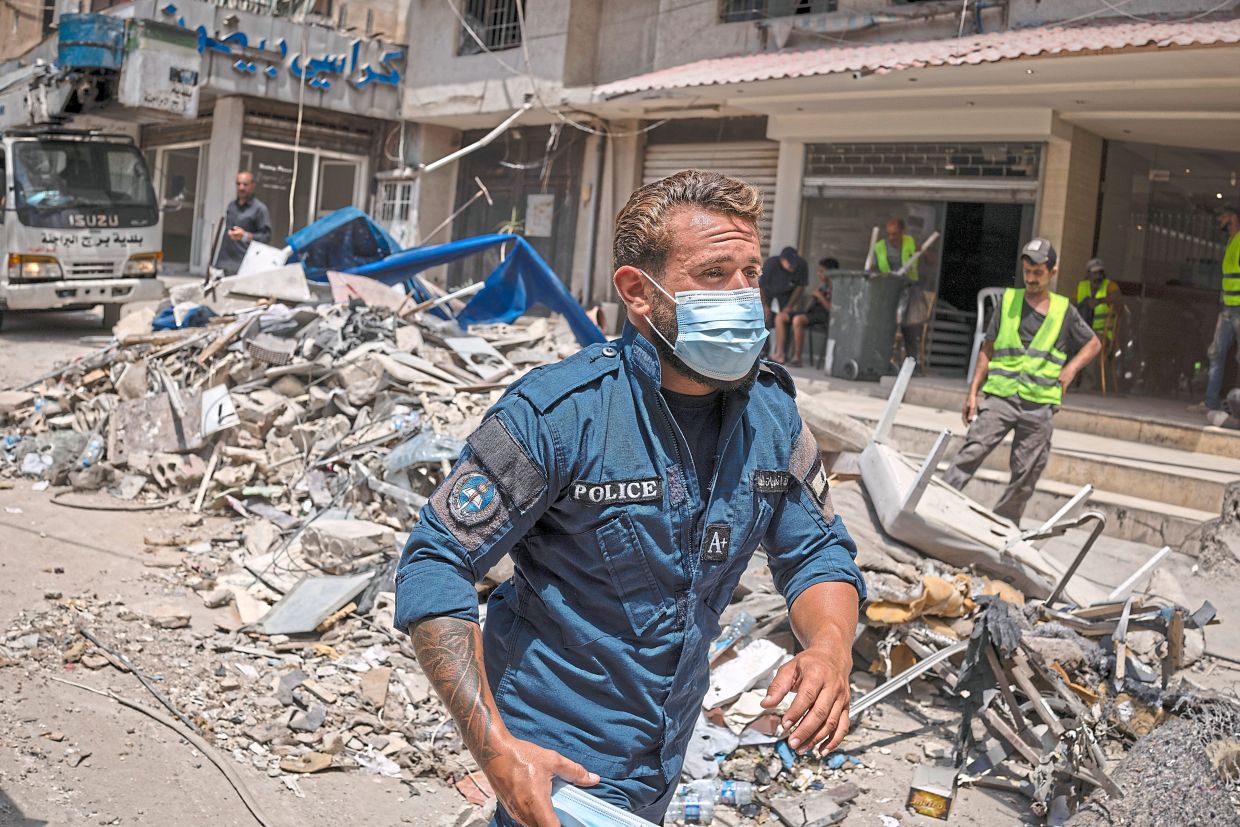
A large crowd of mourners for Ismail Haniyeh, a top political leader of Hamas, at his funeral in Tehran. — ©2024 The New York Times Company
FOR months, diplomats and analysts in foreign capitals have worried that prolonged political upheaval in the United States could invite aggression abroad, whether in Russia’s waging of war in Ukraine, North Korea’s rogue nuclear ambitions or China’s expansionist designs in the South China Sea.
Now, less than 100 days before Americans elect a new president, that broader geopolitical crisis has erupted in the familiar theatre of the Middle East. The targeted killings of Hezbollah and Hamas leaders in Beirut, Lebanon and Tehran, Iran, have deepened fears of a regionwide conflict – one that the US, caught up in its own political drama at home, may have little capacity to avert or even contain.
Secretary of State Antony Blinken had said the US was not involved in, or even informed of, the operation in Tehran, which the Iranian government swiftly blamed on Israel. To some, Blinken’s statement confirmed a dangerous power vacuum in the region.
“We thought it would be Vladimir Putin or Xi Jinping or Kim Jong Un who would take advantage of this period in the U.S.,” said Vali R. Nasr, a professor of international affairs at the Johns Hopkins School of Advanced International Studies.
“Nobody counted on an American ally doing it.”
“This is going to make the region extremely nervous,” said Nasr, who served in the State Department during the Obama administration. “It’s never good for the United States to be seen as not in control.”
For President Joe Biden, who expended time and prestige trying to broker a deal between Israel and Hamas to release hostages in the Gaza Strip, the back-to-back assassinations of the Hezbollah commander, Fuad Shukr, and the Hamas political leader, Ismail Haniyeh, could signal the futility of his diplomatic efforts, at least for now.
Moreover, the US could find itself drawn into a direct conflict with Iran, something both countries have taken pains to avoid through months of tensions over the war in Gaza. In April, US officials worked behind the scenes to persuade Iran to limit its military reprisal against Israel after Israeli jets carried out a deadly strike on a meeting of Iranian generals in Damascus, Syria.
This time, however, the killing of Ismail, while he was in Tehran to attend the swearing-in of Iran’s new president, Masoud Pezeshkian, suggests that American sensitivities counted for little, analysts said. Iranian Supreme Leader Ayatollah Ali Khamenei quickly blamed Israel and vowed “harsh punishment.”
“That is an attempt to humiliate the Iranians by showing they can’t protect their own guests at that ceremony,” said Daniel Levy, who runs the US/Middle East Project, a research organization based in London and New York. “It signifies another crossing of multiple lines by Israel.”
Israeli prime minister Benjamin Netanyahu brought his case against Iran directly to Washington. Addressing a joint session of Congress last month, he said: “Iran’s axis of terror confronts America, Israel and our Arab friends. This is not a clash of civilizations. It’s a clash between barbarism and civilisation.”
Dozens of Democrats boycotted Netanyahu’s speech to protest Israel’s handling of the war in Gaza. But he appeared undeterred, and the visit gave him a firsthand look at a country in unusual political flux. He met with Biden only four days after he withdrew from the presidential race, as well as with Vice President Kamala Harris, who has swiftly become the Democratic nominee.
While Harris echoed Biden’s support of Israel’s right to defend itself, she also made clear that she would speak out on behalf of the civilians killed and maimed in the Gaza conflict.
“We cannot look away in the face of these tragedies,” she said, in language notably stronger than that normally used by Biden. “We cannot allow ourselves to become numb to the suffering, and I will not be silent.”
Netanyahu later travelled to Palm Beach, Florida, to meet with former President Donald Trump, the Republican nominee. When Netanyahu handed him a photograph of a child who he said had been taken captive by Hamas during the Oct 7 attacks, Trump told him, “We’ll get it taken care of.”
Some analysts have suggested that Netanyahu, an astute observer of American politics, saw an opportunity in the political tumult in the US to act against Hamas and its sponsor, Iran.
“Maybe he decided there is a definite vacuum in Washington, so this is the time to act,” Nasr said.
The loss of US influence in the Middle East would normally worry allies in Europe. But they have their own problems. In France and Germany, leaders are preoccupied by surging right-wing populist parties. In London, a new Labour prime minister, Keir Starmer, has edged away from the US in its handling of Israel, after months in which London had been in lock step with Washington.
Britain last week dropped its objections to arrest warrants sought by the International Criminal Court for Netanyahu and Israeli Defense Minister Yoav Gallant. It is weighing whether to suspend weapons shipments to Israel, though it has put off a decision pending further legal review.
The strikes also came at a moment of rising Israeli anxiety about Iran’s nuclear ambitions, which have expanded since the Biden administration’s efforts to revive parts of a 2015 nuclear agreement with Iran collapsed in 2022.
Pointing out the ack of leverage the US has over Iran on its nuclear program, some analysts suggested that Israel might have acted partly out of frustration that the West had not prevented Iran from edging closer to producing a bomb. Provoking a conflict, they said, could give Israel the pretext to strike its nuclear facilities.
“Israel has been quite concerned about the creeping development of the Iranian nuclear program,” said Jonathan Paris, a former Middle East fellow at the Council on Foreign Relations. “The US is noticeably not doing much about it. If I were an Israeli interested in deterrence, this might be one way to do it.”
The assassination could deprive the US of a fresh diplomatic partner in the form of Iran’s new president, Pezeshkian. A heart surgeon who beat a hard-line conservative in July, he has portrayed himself as a reformer. But analysts said it would be difficult for him to pursue any diplomatic engagement with the West after such an embarrassing attack.
Still, other experts warned against exaggerating the importance of Pezeshkian, given the paramount role of Khamenei. The president’s “relative impotence was exposed on day one,” said Karim Sadjadpour, an expert on Iran at the Carnegie Endowment for International Peace in Washington.
Sadjadpour also cautioned against assuming that Iran would risk an all-out war over the killing of Ismail. It did not do so after the US assassinated General Qassem Soleimani, the powerful leader of its Quds Force, in 2020. Iran’s previous reprisals against Israel have never proved all that effective.
“Israel has routinely humiliated the Islamic Republic by assassinating high-level targets inside Iran, but Iran’s retaliations have never deterred future Israeli operations,” Sadjadpour said.
“The parameters of an Iranian retaliation need to be face-saving but not life-threatening for the regime.” — ©2024 The New York Times Company
This article originally appeared in The New York Times.
Targeted killing
Rescue workers at the scene of an Israeli airstrike in Dahiyeh, a suburb of Beirut. — ©2024 The New York Times Company
Rescue workers at the scene of an Israeli airstrike in Dahiyeh, a suburb of Beirut, Lebanon, on Wednesday, July 31, 2024. (Diego Ibarra Sánchez/The New York Times)
Rescue workers at the scene of an Israeli airstrike in Dahiyeh, a suburb of Beirut on July 31. — ©2024 The New York Times Company
Rescue workers at the scene of an Israeli airstrike in Dahiyeh, a suburb of Beirut, Lebanon, on Wednesday, July 31, 2024. (Diego Ibarra Sánchez/The New York Times)










































